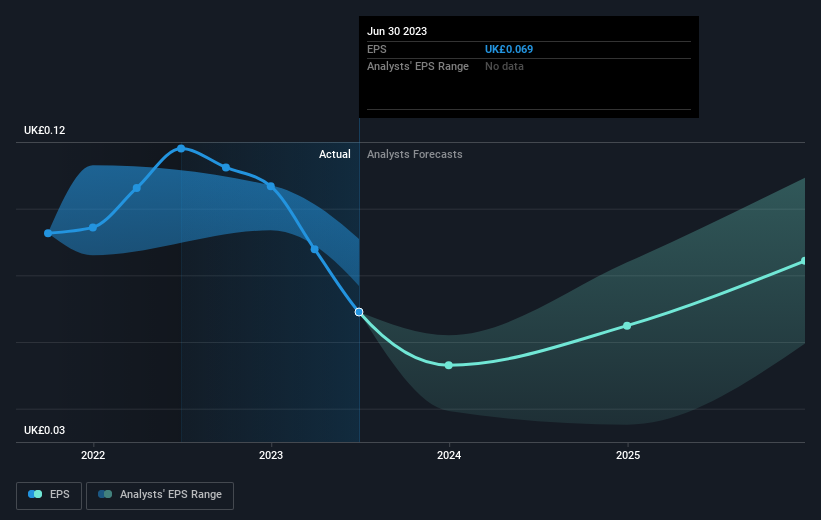Stock Analysis
- United Kingdom
- /
- Media
- /
- LSE:ITV
Investors five-year losses continue as ITV (LON:ITV) dips a further 3.4% this week, earnings continue to decline

Ideally, your overall portfolio should beat the market average. But even the best stock picker will only win with some selections. At this point some shareholders may be questioning their investment in ITV plc (LON:ITV), since the last five years saw the share price fall 54%. We also note that the stock has performed poorly over the last year, with the share price down 33%. Furthermore, it's down 12% in about a quarter. That's not much fun for holders.
With the stock having lost 3.4% in the past week, it's worth taking a look at business performance and seeing if there's any red flags.
See our latest analysis for ITV
To paraphrase Benjamin Graham: Over the short term the market is a voting machine, but over the long term it's a weighing machine. By comparing earnings per share (EPS) and share price changes over time, we can get a feel for how investor attitudes to a company have morphed over time.
During the five years over which the share price declined, ITV's earnings per share (EPS) dropped by 8.1% each year. This reduction in EPS is less than the 15% annual reduction in the share price. This implies that the market was previously too optimistic about the stock. The less favorable sentiment is reflected in its current P/E ratio of 8.59.
You can see how EPS has changed over time in the image below (click on the chart to see the exact values).

Dive deeper into ITV's key metrics by checking this interactive graph of ITV's earnings, revenue and cash flow.
What About Dividends?
When looking at investment returns, it is important to consider the difference between total shareholder return (TSR) and share price return. Whereas the share price return only reflects the change in the share price, the TSR includes the value of dividends (assuming they were reinvested) and the benefit of any discounted capital raising or spin-off. So for companies that pay a generous dividend, the TSR is often a lot higher than the share price return. We note that for ITV the TSR over the last 5 years was -45%, which is better than the share price return mentioned above. This is largely a result of its dividend payments!
A Different Perspective
While the broader market lost about 2.5% in the twelve months, ITV shareholders did even worse, losing 28% (even including dividends). Having said that, it's inevitable that some stocks will be oversold in a falling market. The key is to keep your eyes on the fundamental developments. Regrettably, last year's performance caps off a bad run, with the shareholders facing a total loss of 8% per year over five years. We realise that Baron Rothschild has said investors should "buy when there is blood on the streets", but we caution that investors should first be sure they are buying a high quality business. It's always interesting to track share price performance over the longer term. But to understand ITV better, we need to consider many other factors. For instance, we've identified 2 warning signs for ITV that you should be aware of.
If you like to buy stocks alongside management, then you might just love this free list of companies. (Hint: insiders have been buying them).
Please note, the market returns quoted in this article reflect the market weighted average returns of stocks that currently trade on British exchanges.
Valuation is complex, but we're helping make it simple.
Find out whether ITV is potentially over or undervalued by checking out our comprehensive analysis, which includes fair value estimates, risks and warnings, dividends, insider transactions and financial health.
View the Free AnalysisHave feedback on this article? Concerned about the content? Get in touch with us directly. Alternatively, email editorial-team (at) simplywallst.com.
This article by Simply Wall St is general in nature. We provide commentary based on historical data and analyst forecasts only using an unbiased methodology and our articles are not intended to be financial advice. It does not constitute a recommendation to buy or sell any stock, and does not take account of your objectives, or your financial situation. We aim to bring you long-term focused analysis driven by fundamental data. Note that our analysis may not factor in the latest price-sensitive company announcements or qualitative material. Simply Wall St has no position in any stocks mentioned.
About LSE:ITV
ITV
An integrated production, broadcasting, and streaming company, which creates, owns, and distributes content on various platforms worldwide.
Flawless balance sheet, good value and pays a dividend.

